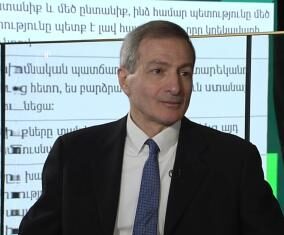By Ani Avetisyan
The Armenian government has announced it is scaling back a program that provides housing subsidies to refugees from Nagorno-Karabakh, casting the decision as a move to promote self-sufficiency and stimulate the integration of refugees into society. But for the tens of thousands of Karabakh refugees receiving assistance, the announced reduction in benefits is likely to cause a spike in discontent.
Armenia since November 2023 has provided a monthly stipend of 50,000 drams (about $125) to refugees from Karabakh without housing or government shelter. This assistance has supported most of the estimated 105,000 Armenians who fled Karabakh after Azerbaijan reconquered the entire region in September 2023.
Under a plan approved during a cabinet meeting in late November, subsidies will be scaled back starting in April 2025. Only children, college students, pensioners and individuals with disabilities — about 54,000 refugees, according to government estimates — will continue to receive aid. Payments for eligible individuals will decrease to 40,000 drams in April and 30,000 drams by July. Working-age refugees who do not fall into these groups will lose benefits.
Armenian Prime Minister Nikol Pashinyan said the changes are intended to motivate refugees to seek employment or entrepreneurship opportunities. “We need to create conditions where people can support their families through their own work,” Pashinyan said.
The Armenian government is struggling to encourage Karabakh Armenians to apply for Armenian citizenship because doing so would cause them to lose temporary protection status as a refugee. As of this November, only about 1,500 Karabakh residents have applied for citizenship, while over 90,000 have received temporary protection status as refugees. According to the country’s Labor Ministry, more than 25,000 refugees have already secured jobs or started businesses.









